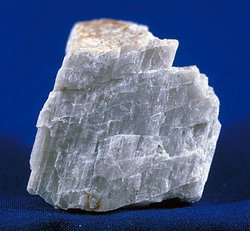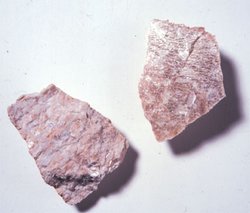Feldspar

| Topics: |
Geology (main)
|
Contents
Background
Feldspar is the mineral name given to a group of minerals distinguished by the presence of aluminum (Al) and the silica ion (SiO4) in their chemistry. This group includes aluminum silicates of soda (sodium oxide), potassium (potassium oxide), or lime (calcium oxide). Feldspar is the single most abundant mineral group on Earth. Together, the varieties of feldspar account for one half of the Earth’s crust. The minerals included in this group are orthoclase, microcline, and the plagioclase feldspars. They form in a variety of thermal environments, during the crystallization of liquid rock (magma), by metamorphism of rocks deep in the earth, and in sedimentary processes.
Feldspars are relatively hard at 6 on Mohs' hardness scale. Feldspars are generally light-colored, including white, pink, tan, green, or gray. The color varies due to impurities within the crystal structure. Feldspar is the mineral that gives granite its pink, green or gray color.
When feldspar weathers from igneous or metamorphic rocks, it can accumulate as sand. It is, however, easily weathered, and eventually will break down into clay.
Name
The name feldspar is a contraction of the longer name fieldspar, as some early specimens were found in fields. The term spar is a generic term used by geologists to refer to any non-metallic mineral with a glassy (vitreous) luster that breaks on distinct flat surfaces (planes). The name was officially given by Johan Gottschalk Wallerius in 1747.
Sources

Feldspar is mined from large granite bodies (called plutons by geologists), from pegmatites (formed when the last fluid stages of a crystallizing granite becomes concentrated in small liquid and vapor-rich pockets that allow the growth of extremely large crystals), and from [[sand]s] composed mostly of feldspar.
Because feldspar is such a large component of the Earth’s crust, it is assumed that the supply of feldspar is more than adequate to meet demand for a very long time to come. It is so abundant that geologists and economists have not even compiled data on potential deposits of feldspar for future consumption. Present mines worldwide are adequately meeting the need for raw feldspar.
The United States produces about $45 million worth of feldspar annually. North Carolina generates nearly half of the raw feldspar produced in the United States. Six other states produce smaller amounts. Other countries producing feldspar include Brazil, Colombia, France, Germany, India, Mexico, Norway and Spain.
Uses
Feldspar is used to make dinnerware and bathroom and building tiles. In ceramics and glass production, feldspar is used as a flux. A flux is a material that lowers the melting temperature of another material, in this case, glass.
Substitutes and Alternative Sources
Feldspar can be replaced by other minerals and mineral mixtures of similar physical properties. Minerals that could be used to replace feldspar include pyrophyllite, [[clay]s], talc, and feldspar-silica (quartz) mixtures. The abundance of feldspar will make these substitutions unnecessary for the foreseeable future.
Further Reading
- Common Minerals and Their Uses, Mineral Information Institute.
- More than 170 Mineral Photographs, Mineral Information Institute.
| Disclaimer: This article is taken wholly from, or contains information that was originally published by, the Mineral Information Institute. Topic editors and authors for the Encyclopedia of Earth may have edited its content or added new information. The use of information from the Mineral Information Institute should not be construed as support for or endorsement by that organization for any new information added by EoE personnel, or for any editing of the original content. |